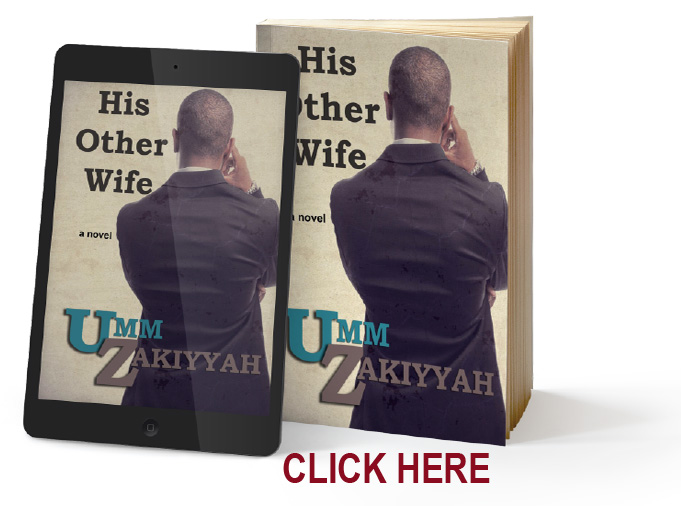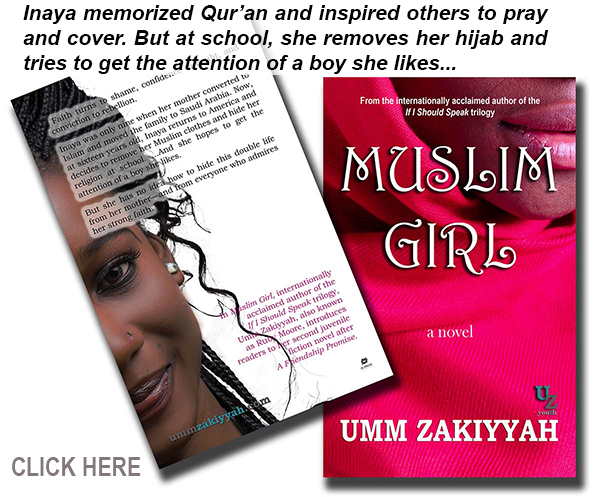“Too much admiration breeds contempt. It is better, I think, to just be understood.”
—the character Salima in His Other Wife by Umm Zakiyyah
~
Keep supporting MuslimMatters for the sake of Allah
Alhamdulillah, we're at over 850 supporters. Help us get to 900 supporters this month. All it takes is a small gift from a reader like you to keep us going, for just $2 / month.
The Prophet (SAW) has taught us the best of deeds are those that done consistently, even if they are small.
Click here to support MuslimMatters with a monthly donation of $2 per month. Set it and collect blessings from Allah (swt) for the khayr you're supporting without thinking about it.
“It’s not good when Pakistani girls marry Black men,” she said to me.
I sat behind the desk in my office trying to maintain a pleasant expression. It was moments like this that I both treasured and dreaded. I’d always taught my students that they could talk to me about anything, that they didn’t have to feel ashamed about their feelings and emotions, and that if they ever needed a listening ear, I was there.
Naturally, it had taken some time for the students to trust me enough to open up and be honest. They were teenagers after all. They viewed most adults with distrust. They even viewed most teenagers with distrust. Sometimes they didn’t even trust themselves. So they sat through most classes looking disgruntled and irritable, glancing every now and then at the clock or their wristwatch.
Time will pass. Will you?
My students laughed when I told them about the sign that one of my teachers had taped over the clock when I was in high school.
But as time went on, my students began to look less disgruntled and irritable, and more curious and attentive. Then finally, they relaxed. And when that happened, they became little bursts of energy with so much on their hearts and minds that there wasn’t enough time to get through all of it. But I tried my best to incorporate into each lesson and assignment what was most important to them. Every essay, discussion, and debate had their personal touch, and sometimes it was designed entirely by them.
“There’s no use teaching in a context that nobody cares about or understands,” I’d tell them whenever they asked why I even bothered adjusting the lesson themes for them. “Learning begins when you see yourself in what is being taught,” I’d explain. “Besides,” I’d joke, “even I’m allergic to boredom.”
“Why do you think it’s a bad idea for Pakistani girls to marry Black men?” I asked my student in as neutral a voice as I could muster. I knew my recent lesson theme regarding overcoming cultural and racial prejudice had inspired this office visit, so I told myself she had every right to express her feelings to me after class.
However, on a personal level, it was difficult to withhold expressing my disagreement with the blanket generalization. It wasn’t that I thought it was a good idea for Pakistanis to marry African-Americans. It was just that I disliked using the terms good or bad regarding anyone’s halaal options, especially for something as intimate as marriage.
“When we let them,” she said, speaking candidly as a representative of Pakistani culture, “things always turn out bad.”
“What do you mean?” I asked, genuinely curious about what she was referring to.
“They usually seem like good men,” she explained, “but then they don’t treat the girl right, and she ends up miserable. Then the marriage falls apart, and it hurts the whole family.”
I waited, expecting a more comprehensive explanation. But the extended silence told me that she didn’t have anything else to add.
An apologetic look crept on her face as she realized that her words could possibly be offensive. But I nodded to acknowledge that I’d heard her, though I had a different perspective.
“When things turn out like that,” I said finally, “it’s usually because other cultures are unfamiliar with Black American culture. So you have no way to distinguish between a good or bad person for marriage. A person whose external appearance suggests he is a good Muslim is automatically counted as a good man to marry. But another person from that same culture would see signs that you wouldn’t because they are more familiar with the subtle red flags that someone on the outside wouldn’t pick up on.”
I then explained to her the dangers of feeling comfortable making assumptions about a group of people simply because you felt you’d already assumed the best but they let you down.
“Starting off with the assumption of good is usually just the flip side of starting off with the assumption of bad,” I told her. “They’re really not too different from each other.”
And often, the former leads to more long-term prejudice than the latter, I explained. Because it’s much more difficult to change your prejudicial attitude once you imagine you’ve already “given them a chance.”
Unhealthy Prejudice
Unhealthy prejudice isn’t only in judging certain people as generally bad. It is also in judging certain people as generally good. Too often, in our efforts to fight our inclinations toward superficial prejudice, we engage in overcompensation and voluntary blindness, as many cultural groups do in their enthusiasm to embrace “the other,” whether in friendships or marriages.
Here, if our cultural or privileged background consistently judges another culture or group negatively, we go to the opposite extreme by consistently judging them positively. But in both cases you are using superficial cues to come to a conclusion about someone, and this is the very essence of prejudice.
Of the harms of the presumption of good in a people is that when we face clear evil amongst them (as we inevitably will with any group of human beings), we either rationalize the evil and thus become a force against good. Or we give up entirely and become even more prejudiced than before, thinking, “I thought they were good, but they really are corrupt!”
Yet the very meaning of bigotry is the inability (or refusal) to look at others as individuals who are fully human just like you.
Thus, lack of prejudice requires the assumption of neither good nor evil. In fact, it requires no assumptions at all. Except the assumption of humanity.
Therefore, the only way to overcome unhealthy prejudice is to allow a person’s character, as displayed in their patterns of speech and behavior, to tell us of their good or evil. Just as your own patterns tell others of yours.
Umm Zakiyyah is the internationally acclaimed author of the If I Should Speak trilogy. Her latest novel His Other Wife is now available. Read HIS OTHER WIFE novel now: CLICK HERE.
To learn more about the author, visit ummzakiyyah.com or subscribe to her YouTube channel.




















M
April 18, 2016 at 9:23 AM
“Unhealthy prejudice isn’t only in judging certain people as generally bad. It is also in judging certain people as generally good.”
SubhanAllah! Another amazing piece by Umm Zakiyyah. It took me a while to understand that prejudice is prejudice wheather you are assuming a certain group people to be good or bad.
Because in the end it’s the individuals that define themselves not their societies or families. There are always black sheep of the family and people who stand out. It takes more then the first impression to know the person.
GregAbdul
April 19, 2016 at 3:03 AM
al hamdulillah. This is a very good teaching about prejudice and Muslims. But if we are honest, black Americans are not suffering because there are a bunch of Pakistanis out there who have over-assumed our goodness. We are “abid.” They don’t want their daughters marrying us because they assume we are inferior. Some of it is my black American Muslim brothers and sisters. “The honorable Elijah Muhammad” you say, and then you wonder why people don’t want to stand next to you in Salah? But too much of it is assuming that black Americans don’t know Islam as well as immigrants. Yet, especially for the serious convert, the opposite is usually the case. Some people are better at looking Muslim. But I have seen stylishly brown people like this, who once you ask them about anything outside of Hanafi fiqh, they are lost. Further, it’s not about knowing Islam as practiced in Karachi or Lahore, but applying Islam to our specific local Western situations. We are severely underdeveloped when it comes to managing racial and ethnic difference in the American ummah. Since 9/11, Hate Inc. has run circles around us and been very successful at getting Americans to hate us because we are unable to work with all the difference contained in the American Muslim community. Our mosques remain separate and unequal and anyone who tries to talk about it is frowned at by the Uncles and the Use-to-be NOI’s. I can only imagine that once it really gets bad enough, we will actually try to follow the Sunnah of race relations instead of what our tribes teach us today.
May Allah guide us.
Michael Scott
April 20, 2016 at 4:57 PM
Prejudice | Define Prejudice at Dictionary.com
http://www.dictionary.com/browse/prejudice
an unfavorable opinion or feeling formed beforehand or without knowledge, thought, or reason. 2. any preconceived opinion or feeling, either favorable or unfavorable. 3. unreasonable feelings, opinions, or attitudes, especially of a hostile nature, regarding an ethnic, racial, social, or religious group.
I really liked this article by Umm! He makes some very strong valid points! Predjudice isn’t just having negative preconceived ideas and opinions about others, as meaning number 2 states above. Prejudging others as being good can be very dangerous, just as prejudging others as being evil can be. Being a sincere Christian, I know that judging others is wrong, for JESUS said “Judge not, lest ye be judged.” I’m used to thinking about prejudice as a negative way of thinking about others, but thinking positively about others in a foolish manner by assuming they’re good certainly has its problems too. That’s why we tell our children not to talk to strangers, because they might be dangerous. I’m not saying it’s a sin for children to talk to strangers, I’m simply saying that we want and need our children to exercise wisdom and caution whenever they’re around strangers because some strangers are out to harm them. Adults, and people in general, need toexercise wisdom and caution when dealing with others, and choosing not to assume that someone is good or evil is definitely a good way to be wise, cautious, and unprejudiced. Since we’re human, we’re not perfect, we make mistakes, but hopefully we’ll learn from our mistakes (and the mistakes of others) so that we make better choices and receive true discernment from GOD to know what’s good and evil.
GregAbdul
April 23, 2016 at 9:37 AM
Umm is arabic for Mom. The name means, mother of Zakiyyah. Thanks for reading and contributing to this conversation. All of us want to be seen the way God made us. God made one of each of us. While we belong to several groups, each of us, except for the most extreme groups, have individual opinions and ways and we all want to be respected as individuals and not given an unthinking label. Bad comes in every color and stripe. Final punishment rests with God. Try to give Muslims the chance to be good to you. Some of us will fail, but I believe, God willing, some of will find a way to repay your kindness.
SH
May 8, 2016 at 12:00 AM
OK, good points made in this article. However, isn’t polygamy illegal in this country? Why the stories about it?
Umm Zakiyyah
May 8, 2016 at 12:50 AM
SH, Thank you for your comment.
I’m unsure how to answer your question for primarily 3 reasons:
1. My stories are fiction, and regardless of the “legality” of an issue, it is not illegal for it to form the plot of a fictional story.
2. Fiction story aside, using the term “husband” or “wife” to describe someone is not illegal. Unless America has become a tyrannical police state while I was unaware, we are free to refer to our friends and romantic partners by any words we choose. My friends and I sometimes call acquaintances “sisters” and “cousins”, and some elders “aunts” or “uncles” or even “Mom” or “Dad.” But we seek no legal privileges as result, because social (or even religious) terms are not the same as legal claims.
3. In Islam, there is no necessary connection between a legal marriage and a “nikaah” (Islamic contract). Thousands of Muslims living in monogamy do not have legal marriages and do not desire to. The same holds for those who live in what Islam would define as polygamy, but what America would define as merely a consensual adult relationship.
Personally, I’m quite puzzled why I continuously receive this question as an author. I thought it was common courtesy to respect consensual adult relationships as only the business of the people involved. It’s terrifying that we now have people calling for the criminalization of WORDS people use to describe themselves and the people they love (but only when the words refer to a lifestyle that does NOT involve sin).
But I do thank you for your comment and question, however puzzling the inquiry is.
Umm Noor
May 14, 2016 at 8:39 AM
Its so true ummzakiyya. The good ones start expecting all the good flattery and the moment they are disagreed with, you’ve had it.